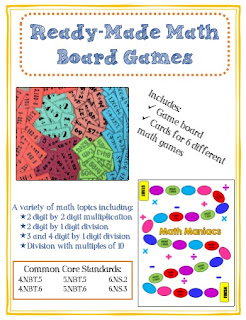 What am I talking about? You can use simple, easy to make games to get your students practicing new concepts and learning while they do it, and best of all, NO worksheets included! You are probably thinking: But I need them to know how to add mixed numbers and they need to practice in order to get better at it. Enter: Worksheets. But here's the deal, take the problems you would put on that dreaded worksheet and use them to create your game.
What am I talking about? You can use simple, easy to make games to get your students practicing new concepts and learning while they do it, and best of all, NO worksheets included! You are probably thinking: But I need them to know how to add mixed numbers and they need to practice in order to get better at it. Enter: Worksheets. But here's the deal, take the problems you would put on that dreaded worksheet and use them to create your game. My Go-To Games are Bingo and Board Games!
Board Games: Make a game board and then make simple "task cards" for the children to draw from before they roll their dice. I prefer to have all of my students answer the question before we can go on versus having just the student who's "turn" it is to answer the question. Better yet, head over to TpT and buy my Ready Made Board Games!
BINGO: Make up the problems to call out and either have students make their own boards by placing the answers or create randomized boards on your own for a quicker start to the game!












